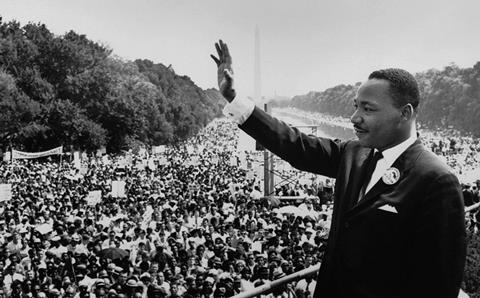It’s 60 years since one of the most iconic speeches of all time was delivered. The American elite did everything possible to conceal a key theme within Martin Luther King’s ‘I have a dream’ message, says Baptist minister Wale Hudson-Roberts

It would become the largest event in the history of America.
An estimated 250,000 people joined in the mile-long march from the Washington Monument to the Lincoln Memorial on August 28, 1963, with campaigners demanding the desegregation of public accommodation and public schools, the redress of violations of constitutional rights, and an expansive federal program to train employees. Their demands were just, and supported by many celebrities of the era, including Bob Dylan and the soul singer, Mahalia Jackson.
The significance of this summer’s day in Washington DC had not been lost on Martin Luther King. His preparation had been meticulous, but it is the extemporaneous section of his speech that day which history remembers.
King’s demand for reparations was very clear
The ‘I have a dream’ passage was a spontaneous addition, which may or may not have been prompted by Mahalia Jackson. She had heard him employ this refrain at a demonstration in Detroit a few months earlier. Jackson and King had a good relationship, he often turned to her when in need of a musical uplift. Now standing next to him, when he began struggling with his prepared text, she shouted: “Tell ‘em about the dream Martin.”
And so, King kicked off. He took the listening crowd to church – as they say. He began slowly. Powerful pauses were combined with clear and exaggerated diction. Precise enunciation are hallmarks of this speech. In his first minute King utters only 77 words. Among the most ubiquitous and possibly misunderstood were:
“In a sense we have come to our nation’s capital to cash a check. When the architects of our Republic wrote the magnificent words of the Constitution and the Declaration of Independence, they were signing a promissory note to which every American was to fall heir. This note was a promise that all men — yes, Black men as well as white men — would be guaranteed the unalienable rights of life, liberty and the pursuit of happiness. It is obvious today that America has defaulted on this promissory note, insofar as the citizens of colour are concerned. Instead of honouring this sacred obligation, America has given the Negro people a bad check, a check which has come back marked insufficient funds.”
Reparatory justice was an important theme in King’s vision. The history of African Americans had been steeped in enslavement; loss of life, dignity, land, and family followed the enslaved for centuries. Each life stolen by their oppressors. Even the new American laws, supposedly providing a semblance of parity for African Americans were disappointing because of their inability to create a just America for African Americans.
King’s demand for reparations was very clear: “In a sense we have come to our nation’s capital to cash a check.” The metaphor starts from the jail cells of Alabama and ends in a New York bank vault. Many young Black people were arrested during the Birmingham Marches. The movement quickly needed to generate large sums of money, leading to the release of the young men. King makes the point that American banks hold trillions of dollars, amounts far exceeding the bail money demanded by the courts. It is locked in American vaults and should be released to compensate the millions of African Americans who attempt to live their lives under the curse of enslavement, those whose economic opportunities had been drastically curtailed because of history’s cruel past. King is adamant. Reparations, alongside other concrete expressions of justice need to happen now.
Such urgency was not at all surprising. Remedying the inherited inequalities would ultimately only happen through reparations. Reparations, for King, would entail America, blighted by exploitation, taking its own history seriously, a concrete acknowledgement of the effects that harmful policies had had on Black bodies. Reparations was a way of making the country whole and providing African Americans with the opportunities to become some bodies.
Demanding that America should repair its damage was a bold gesture. It certainly presented a powerful challenge to the structures that linked privilege with whiteness. It forcibly challenged the inheritance of European colonialism, the Atlantic Slave Trade, and the heritage of British colonial power. King’s ‘I have a dream’ speech put all these issues and more firmly on America’s agenda.
If King were alive today what contemporary concerns would he encourage congregations to wrestle with? Misogyny would likely be on his list of priorities. In the aftermath of the brutal murder of Sarah Everard, it seems that large swathes of the public are becoming aware of this pressing matter.
I would also expect King to encourage churches to campaign against climate injustice. This is a global injustice. Swathes of Africans and Asians are being forced to leave their homelands, draining their countries of skills and talents, flinging their countries into a cycle of permanent economic depression, not of their countries own making.
Of course, there is poverty. With the cost of living crisis impacting the most vulnerable, King would be motivating churches to identify the root causes of this problem and address its symptoms.
Despite these seismic agendas I maintain that front and centre in King’s thinking would remain a clarion call for racial justice demonstrated through reparations. The American elite did everything possible to conceal the theme of reparations that runs through certain sections of the ‘I have a dream’ speech; presenting King as a gradualist and diplomat not a revolutionary committed to white repentance.
Many faith communities, including churches have been silent on this most pressing of issues. The reparatory justice part of King’s speech reminds us of the untold damage colonial powers have inflicted on the Caribbean, and parts of Africa and that reparation has the capacity to bring around restoration and redemption for the brutalised. Churches and church organisations, if really committed to racial justice issues and King’s legacy need to pick up this issue and run with it.


































2 Readers' comments